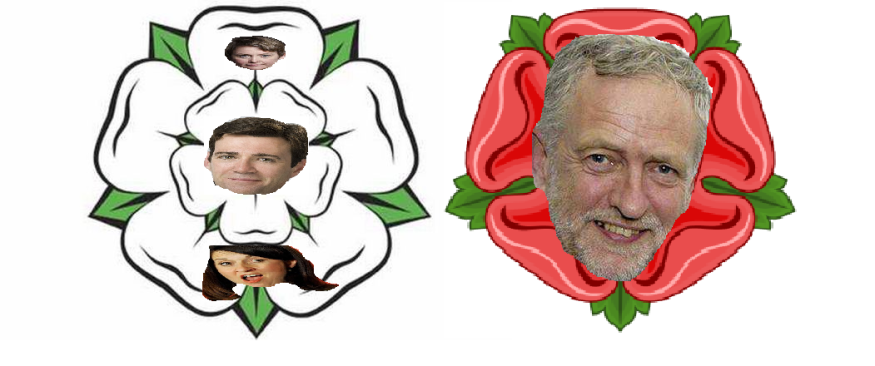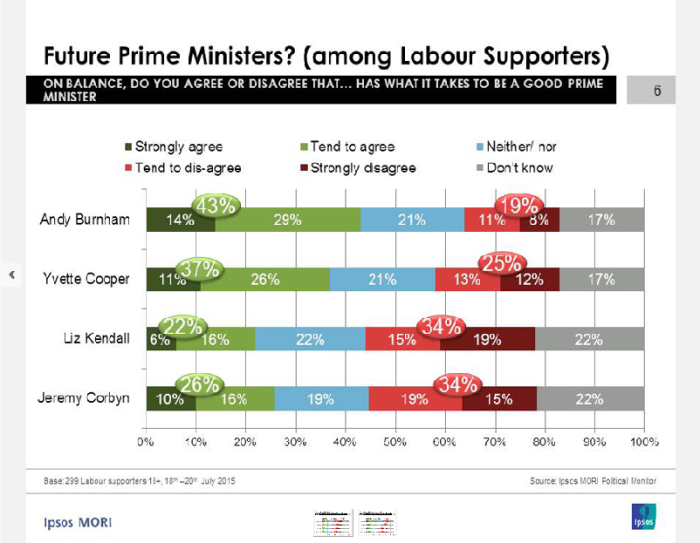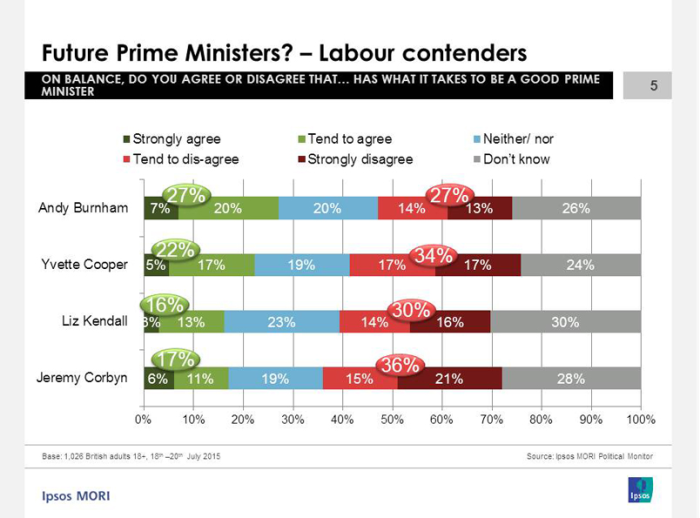There is less than a month left until the victor of the Labour leadership contest is announced, and the media has been filled with pieces talking of Labour reaching a crossroads where they have to choose between head and heart, between opposition and governance. These pieces are as original in their content as they are useful in application, which is to say not at all. This hackneyed false-dichotomy of heart or head shows a complete misunderstanding of what this content is really about. To win once more, Labour needs to find a candidate who can speak from the both the head and from the heart, who can both lead a principled opposition whilst also presenting an electoral challenge to the Conservatives. To do anything less would be a betrayal of both the public Labour seeks to lead, and of the party members Labour claims to be led by.
This of course is a lot easier said then done, and requires a leader of both style and substance, the kind of leader from the ilk of Blair and Cameron. So far, none of the current crop come anywhere near – and this extends to socialist frontrunner Jeremy Corbyn.
Corbyn has certainly forged a strong emotional connection with the heart of the party – from the unionists to the progressive principles the party was founded upon – but leading the polls within the Labour party, skewed younger and more red than the rest of the country, is a somewhat flawed measure of determining appeal to the wider public.
In reality, outside of the left-wing bubble that is the Labour party membership, Corbyn simply is not viewed as presenting credible alternatives to the current Conservative policies, especially in the key area of the economy. Even within his own support base, Cobyn is perceived as far less likely to be a future Prime Minister than either Andy Burnham or Yvette Cooper: 43% of Labour members can see Andy Burnham as a future Prime Minister, compared to just 26% for Corbyn.
This perception of Corbyn as so unelectable is down to more than just his brand of politics, with his political record simply inadequate for somebody running for this position. Though Corbyn has served as an MP for some 30years, he is a life-long back-bencher, always a voice for protest rather than of governance. Even in its overtly-socialist malaise of the Thatcher years, Labour was fronted by men who were more than just protestors – Michael Foot served in cabinet and as Leader of the Commons before he became leader of the party, whilst prominent socialist Tony Benn served both in cabinet and as Chairman of the Labour Party.
Furthermore, both Foot and Benn clearly projected authority as compelling orators and strong personalities. Whilst nobody can doubt that Corbyn is genuine in his ideas, he lacks the gravitas to convince the public he has the strength of character to push his ideas through parliament, or the diplomatic nous to go toe-to-toe with Putin.
This goes beyond just Corbyn’s ability to lead, too, and into whether he even really is the kind of character who wants to lead; he has shown no desire to hold any position of responsibility in his long political career, and moreover only gained the necessary nominations from MPs to enter the contest as he argued he was only there to “widen the debate.”
Yet despite the fact that seemingly none of the MPs who nominated Corbyn want him to lead the party, and despite the fact the man himself entered the race with no intention of leading the party, it is Jeremy Corbyn who is currently topping the polls, not Andy Burnham or Yvette Cooper. People can see Burnham or Cooper as a future PM, but they do not especially want them as PM. Credibility is nothing without connectability, and many in the Labour party seem perfectly prepared to remain in opposition if that is what it takes for the party to reconnect with its roots.
The Blairite candidate Liz Kendall has been leading the “anyone-but-Corbyn” charge, however her own campaign poses little threat to Corbyn. Indeed, that Kendall has joined the likes of Blair and Brown in condemning Corbyn has probably done just as much to help his cause as hurt it; within Labour, her ideas are seen as a betrayal of everything that the party stands for, so the fact she opposes Corbyn just further polarises Labour loyalists away from her Blairite rhetoric and towards Corbyn’s camp.
Kendall doesn’t fare much better in terms of support from the wider public, with her attempts to christen herself as “the candidate the Tories fear” backfiring in the face of opinion polls showing the public neither particularly like her, not perceive her as prime ministerial; a recent Ispos Mori poll showed just 16% of the public perceive Kendall as prime ministerial, which actually puts her below Corbyn and 11% below Burnham. Despite an endorsement from party darling David Miliband, Kendall still only has a paltry 8% share of first preference votes per the latest YouGov poll. A more recent poll by Survation puts Kendall at a somewhat more favourable 12%, whilst a YouGov/London Evening Standard poll puts her support at 6%-12%, depending on how the question was phrased. The most damning indictment of Kendall’s irrelevance, however, is that the most recent YouGov/Times poll did not even bother to ask respondents about their support for Kendall.
Yvette Cooper has too many factors against her to really establish any kind of connection, either with her party or with the wider electorate. Some of this comes down to how she is perceived as being close to the dark side of both New Labour and Miliband’s Labour. Obviously, her marriage to Ed Balls strongly connects her to the economically unpopular positioning of Miliband’s Labour. Furthermore, Cooper is connected to the fiscal irresponsibility of New Labour through her role as Chief Secretary to the Treasury from 2008-2010 which, when combined with her outright refusal to concede any sort of overspend during the New Labour years, will lead to the public perceiving her as lacking economic credibility; ironic, considering Cooper’s repeated claims that she is the most credible candidate.
However, this doesn’t account for Cooper’s failure to connect with such large swathes of the party. The reason for this does not lie in any past misdemeanours, but in the failings of the present; Cooper has run a weak and incredibly vague campaign that offers nothing to the party. Compare this to her competitors: Corbyn has offered mass reindustrialisation and nationalisation; Burnham devolution, public rails and universal care for mental health; Kendall has offered to cut back on Labour’s welfare spending and forge much closer ties with businesses, small and large.
Cooper has offered nothing substantial, failing thus far to even launch a manifesto as Corbyn and Burnham have. The most “radical” (in her own words) policy she has offered is universal free child care. Whilst admirable, such a policy is hardly the sign of a greater vision, and is in all honestly probably a calculated move by her campaign team to push Yvette’s ability to connect with the female vote. Indeed, Cooper has frequently tried to play up the gender card this debate; when asked in first televised debate what qualities she shared with Nicola Sturgeon that would make her a good leader, her only response was to say that she was a woman and stress the need for Labour to finally elect a female leader. She has even gone as far as to accuse Burnham’s supporters of sexism over a headline that maliciously misquoted Burnham-supporter Lord Falconer.
Combine this with late calls for Burnham to pull out for “failing to offer an alternative to Corbyn” (whilst herself not publishing a manifesto) and making grubby deals with Kendall to minimise Corbyn’s share of second and third preference votes, and it is unsurprising that so many within the Labour movement prefer the more positive campaign of Corbyn.
This blandness is certainly calculated, as a means to get a high amount of second preference votes and maintaining an appeal to voters across the party. However, this same blandness is what created the vacuum of ideas necessary for an idealist like Corbyn to thrive in. Trying to sell herself as a safe pair of hands and as a woman who can provide a new and more inclusive face to Labour simply was never going to be enough when she has been so bereft of anything resembling a vision, for the party or the country, in this campaign. Cooper may share her broadly centrist position with Blair, but she lacks any kind of overaching vision.
None of the rivals to Corbyn have been great in this regard, but Cooper has been the worst of all – Burnham has his ideas of a widespread devolution of power widening the scope of politics, whilst Kendall has a somewhat-muddled but undeniably consistent focus on forging an economically prosperous Britain built upon meritocratic principles. Conversely, Cooper’s platform is incredibly negative, with another of her driving soundbytes being the need to “not lurch left or right” – the kind of wretchedly insipid rhetoric that instantly draws unfavourable comparisons to the disastrous “look left, look right and cross” 2015 election campaign of the Lib Dems. Politicians like Tony Blair succeeded because their ideas were too nuanced to be defined as simply left or right; politicians like Nick Clegg failed because their ideas were too confused to be defined as anything.

As for Andy Burnham, the early frontrunner? His early indecision and refusal to think big allowed Jeremy Corbyn to seize the momentum, forcing Burnham onto the back-foot throughout the campaign. He has spoken so frequently of Labour as being “scared of its own shadow,” but has himself only gained the courage to announce sweeping policies like renationalising the rail after the surge in Corbyn support, and consequently Burnham has forced himself to play the part of reactionary rather than progressive as a result of this earlier non-committal stance.
Furthermore, Burnham has also created an image of himself within the party’s memberbase as inconsistent and weak, lacking the moral strength to oppose the austerity of the Conservatives. He has not always possessed the courage to follow through with his convictions in the same way that Corbyn has, most notably seen as he criticised the Conservative welfare bill, but refused to vote against it. Indeed, he has been nicknamed “flip-flop Andy” by some in the party.
I still, however, genuinely believe Burnham to be the best choice for Labour, and the only choice if they are to have any real hope of challenging the Conservatives in 2020. Yes, his campaign has had its flaws, but Burnham himself still possess the image and presence of a man who could one day become Prime Minister, with polls consistently demonstrating this. For one, the aforementioned Ispos Mori poll showed 27% of the public see him as a future Prime Minister, over 10% ahead of Kendall and Corbyn, and also comfortably ahead of Cooper. A more recent ComRes poll shows that he is the candidate perceived as most able to improve Labour’s electability (Corybn is unsurprisingly seen as the least).
There are numerous reasons for this; he’s an experienced politician who has served in cabinet, but is not closely associated enough to either New Labour or Miliband to suffer from association with their mistakes. Indeed, he has been able to turn this association into a strength, by using his position in the treasury to argue he knows Labour overspent. On that note, his ability to even admit there was an overspend already sets him apart from Cooper and Corbyn, and puts him as a prime contender to try and shed the perception of irresponsible, borrow-happy Labour
However, if anything can be learnt from the overwhelming success of the media smear campaign against Ed Miliband in the run-up to 2015, it is that the British electorate is extremely fickle. More important than Burnham’s track record or policies is his actual image. Sure, he talks more in soundbytes than English, but look at how the other candidates tried to show their human side on the recent debate on Victoria Derbyshire: Cooper is a career-politician straight out of Oxford, who admits she has “no hobbies” besides being a mum. Kendall likes running. Corbyn enjoy lobbying for human rights and cycling. Cycling. Comparatively, Burnham has a strong image as the MP for the constituency where he grew up, can relate his former position as Sports Minister to his love of football, and a ready smile.
Does this mean I believe Burnham is the perfect candidate, with the perfect campaign? No – far from it. However, I believe he is the only candidate who can reconnect with the public whilst also keeping the party onside – both at elite and grassroots levels – and the only candidate who can only truly offer the British public an alternative to the Conservatives in 2020, because as well as enjoying endorsements from major figures on the political landscape (Neil Kinnock, David Blunkett and Lord Falconer, as well as the Mirror), he has managed to offer a positive vision for the party and the country, without resorting to the negativity of Cooper and whilst staying true to Labour’s core values in a way Kendall has not.
If there is one point worth closing on, it is this: the principled opposition of the 1980s did not further the cause of left-wing politics, rather it crippled it. Standing back and allowing Thatcher to dominate has left us with a country still living in her shadow.
The crippling of the trade unions; the antagonism of the North and of Scotland; the rampant deregulation of our financial sector facilitating the global financial crisis of 2007; the privatisation of our rails. These were the consequences last time Labour chose principles over governance, the inability of Labour to truly oppose the Conservatives in those Thatcher years is being felt now more than ever. Repeating the mistakes of the 80s is not a vision of hope – it is a delusion. Labour needs somebody who can honour its past without becoming trapped in it, who can learn from both the successes and failures and thus truly bring Labour into the modern era. The Britain Jeremy Corbyn envisions died in the 1980s; Labour cannot let its ghost haunt the party any longer.
Conor Dunwoody
Sources
Ispos Mori “Future Prime Ministers?” poll: https://www.ipsos-mori.com/researchpublications/researcharchive/3602/Burnham-leads-the-pack-but-all-Labour-hopefuls-have-work-to-do.aspx
YouGov/Times poll (17th-21st July): https://yougov.co.uk/news/2015/07/22/comment-corbyn-ahead-labours-leadership-contest/
YouGov/Times poll (6th-10th August): http://d25d2506sfb94s.cloudfront.net/cumulus_uploads/document/umiuxdpotn/Results-for-EveningStandard-London-LabourLeader-150812.pdf
YouGov/London Evening Standard poll: http://d25d2506sfb94s.cloudfront.net/cumulus_uploads/document/umiuxdpotn/Results-for-EveningStandard-London-LabourLeader-150812.pdf


